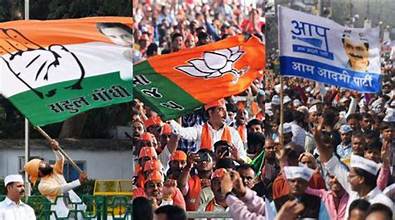
Bypolls in India are typically of fleeting interest, but the Vav assembly by-election in Gujarat has attracted significant attention due to its intersection of caste politics, BJP factionalism, and evolving voter preferences. The seat became vacant after Congress MP Geniben Thakor won the Banaskantha Lok Sabha seat, ending the BJP’s dominance in Gujarat. This by-election offers a glimpse into the shifting political dynamics of the region.
Political Context: Key Players and Their Role
Geniben Thakor’s victory in the Vav assembly seat in 2022 led to its vacancy when she secured the Banaskantha Lok Sabha seat. For the by-election, the BJP has fielded Swaroopji Thakor, while the Congress has nominated Gulabsinh Rajput. A major twist, however, comes in the form of BJP rebel Mavjibhai Patel, who is contesting as an independent candidate, threatening to dilute the BJP’s vote share.
Factionalism Within the BJP: Internal Struggles and Strategic Alliances
The BJP is facing internal turbulence with the entry of Mavjibhai Patel, who is speculated to have covert support from the BJP to undercut the influence of Shankar Chaudhary, an influential BJP MLA from the neighboring Tharad constituency. Chaudhary’s dominance in Banaskantha, especially his role as the chairman of the Banas Dairy, one of Asia’s largest milk producers, has been seen as a potential challenge to BJP interests in the region. However, due to his appointment as the Speaker of the Gujarat Legislative Assembly in 2022, Chaudhary is ineligible for active campaigning, leaving his supporters to navigate the election landscape.
Caste-Based Politics: A Decisive Factor in Vav’s Voter Base
Vav is a region marked by a complex mix of caste politics, with a strong influence from the dairy industry and agriculture. The seat has a voter base of around 310,000, including significant representation from the Thakor (44,000 votes), Rajput (41,000 votes), Chaudhary (40,000 votes), and Dalit (30,000 votes) communities. Historically, the Thakor and Dalit communities have supported the Congress, while the Rajput and Chaudhary communities have been aligned with the BJP. With Geniben Thakor’s victory fresh in memory, the Thakor votes are expected to remain with the Congress, which could sway the voting pattern in favor of the opposition.
Mavjibhai Patel’s Role: A Gamechanger in the Election
Mavjibhai Patel, a member of the Chaudhary community, has further complicated the political equation. Allegations suggest that the BJP may be tacitly backing Patel to undermine Shankar Chaudhary’s influence. This may drive the Chaudhary community’s voters away from the BJP’s candidate, shifting support toward Patel, a move that could diminish the BJP’s hold on the region.
Campaign Dynamics: Intense Competition Between BJP and Congress
The Vav by-election is scheduled for November 13, with results to be declared on November 23. Both the BJP and Congress are actively campaigning, with Gujarat Chief Minister Bhupendra Patel and senior BJP leaders visiting the constituency. On the other hand, Congress leaders such as Shaktisinh Gohil and Amit Chavda have been leading rallies that are garnering large crowds. Despite BJP’s efforts, Mavjibhai Patel’s independent rallies are also drawing significant attention, adding to the competitiveness of the contest.
Congress’ Resurgence: A Strong Challenge for BJP
Congress has been regaining momentum in Gujarat, particularly following its success in the 2024 Lok Sabha elections, where it secured at least one seat in the state. In the 2022 Gujarat assembly elections, Congress won 17 seats, with four from Banaskantha, marking its strongest performance in the district. With a rejuvenated political strategy, Congress is aiming to capitalize on its recent successes, making the Vav by-election a critical contest for both parties.
Conclusion: The Political Stakes in Vav
The Vav assembly by-election is not just a local contest; it has broader implications for Gujarat’s political future. Both the BJP and Congress are investing heavily in this race, and the outcome will likely send a strong message about their political standing in the state. As the by-election unfolds, all eyes are on Vav to understand how shifting voter allegiances and internal party dynamics will shape Gujarat’s political trajectory in the years to come.